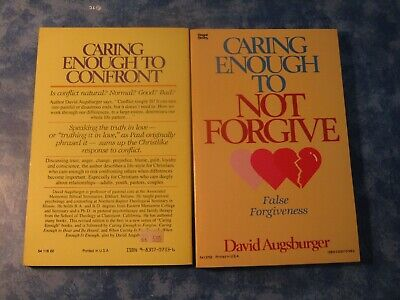A conversation ensued from a comment I made on Facebook this morning:
I'm going to say something controversial. That is something I have a tendency to do. Someone recently told me that it was a sin for someone to hope at another person does not in the end receive God's redemption. My problem with that is this. I think that does not do justice to the pain of people who have been terribly victimized. It disregards and disrespects what they've been through. And even if what that person said is correct, it is terribly insensitive to tell someone that who has been terribly wounded.
In the conversation which followed, I was reminded by a dear friend that we have had a tendency to offer grace in a shallow, superficial way which I believe has done more harm than good. It reminded me of the two books by Myron Augsberger, Caring Enough to Forgive and Caring Enough to Not Forgive. I read these two books, which are actually in one volume, as a confused seminary student in the throes of religious abuse. The title, Caring Enough to Not Forgive, startled me because in my evangelical upbringing, not forgiving was tantamount to sin.
What I found rang true with me though. Augsberger was saying if we forgive before we "process our pain" (to use the phrase of my good friend James R. Newby), we short-circuit true forgiveness and end up sweeping things under the rug and do ourselves harm.
My mind then went to Dietrich Bonhoeffer and his exquisite phrase, "cheap grace."
I believe Bonhoeffer is right about how the church has offered cheap grace. It has resulted in people who claim to be Christian but do not want to, as he put it, pay the Cost of Discipleship. My mentor, Elton Trueblood, was getting at something similar with his book, The Company of the Committed. I believe cheap grace has harmed the church.
But this morning I am thinking about another kind of cheap grace. I think when we push people to forgive before they can process their pain, the grace they end up giving the offender is far too cheap. I think not only has the church "sold grace on the market like cheapjacks wares," but the church has encouraged people to sell their own selves or their psyche as a cheapjacks ware. When we push people to forgive before they are ready, they end up with a cheapened view of themselves. If the grace people give is seen by them as too cheap, the person ends up feeling cheapened.
I replied to my friend this morning:
When we make it too easy, in the end we end up with a different kind of cheap grace. I know that is not what Bonhoeffer meant by the phrase cheap grace, but if we make the grace we offer others too cheap, then it is kind of like prostituting ourselves. We sell ourselves too cheaply and harm is done.
God only knows the harm we have caused by pushing people to offer cheap grace and end up with a cheapened self. I think this harm is at least as harmful as not forgiving at all.



No comments:
Post a Comment